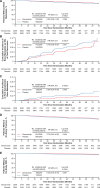Bone Health Outcomes from the International, Multicenter, Randomized, Phase 3, Placebo-Controlled D-CARE Study Assessing Adjuvant Denosumab in Early Breast Cancer
- PMID: 34185259
- PMCID: PMC8342342
- DOI: 10.1007/s12325-021-01812-9
Bone Health Outcomes from the International, Multicenter, Randomized, Phase 3, Placebo-Controlled D-CARE Study Assessing Adjuvant Denosumab in Early Breast Cancer
Abstract
Introduction: D-CARE, an international, phase 3, randomized, double-blind, placebo-controlled study in women with early-stage breast cancer at high risk of disease recurrence, failed to meet its primary endpoint-improvement in bone metastasis-free survival (BMFS) with adjuvant denosumab vs placebo injections. As a result of the limitations of assessing BMFS, which includes relapse in bone with and without extraskeletal recurrences and deaths from any cause, the prespecified exploratory bone endpoints' analysis may provide a more clinically meaningful effect of denosumab in this disease setting.
Methods: The study enrolled women (aged ≥ 18 years) with histologically confirmed stage II/III breast cancer. Patients treated with adjuvant/neoadjuvant chemotherapy meeting inclusion criteria were randomly assigned 1:1 to receive either denosumab (120 mg) or placebo subcutaneously every 3-4 weeks for about 6 months and then every 3 months for a total treatment duration of 5 years. Five prespecified exploratory bone endpoints and post hoc subgroup analysis based on age (< 50 and ≥ 50 years) and menopause status (premenopausal and postmenopausal) were evaluated.
Results: Overall, 4509 women with early-stage breast cancer were assigned to receive denosumab (N = 2256) or placebo (N = 2253). The baseline demographics and clinical characteristics were comparable between the two arms. The hazard ratio (HR) for time to first bone metastasis was 0.82 (95% CI 0.66-1.02; p = 0.068), with HRs of 0.70 (95% CI 0.52-0.94; p = 0.018) for patients < 50 years old and 0.74 (95% CI 0.55-0.98; p = 0.038) for premenopausal patients, favoring the denosumab group. The HRs for time to first on-study fracture and time to first on-study skeletal-related event were 0.76 (95% CI 0.63-0.92; p = 0.004) and 0.52 (95% CI 0.35-0.78; p = 0.001), respectively, again favoring the denosumab group.
Conclusion: The exploratory bone endpoints indicate the benefits of denosumab treatment in patients with high-risk early breast cancer, supporting the expected bone health benefits contributed by denosumab.
Trial registration number: NCT01077154.
Keywords: Denosumab; Exploratory bone endpoints; High-risk early breast cancer; Post hoc analysis.
© 2021. The Author(s).
Figures

References
-
- National Institutes of Health. Cancer stat facts: female breast cancer. 2019. https://seer.cancer.gov/statfacts/html/breast.html. Accessed 25 Sep 2019.
-
- XGEVA®. Denosumab. Thousand Oaks, CA: Amgen Inc.; 2018.
Publication types
MeSH terms
Substances
Associated data
LinkOut - more resources
Full Text Sources
Medical
Research Materials

